- Home
- Case for Action
- IMFUND
- Solution - 3rd generation
- Buy-in
- AGF
- Achievements
- Awards
- Negotiations
- Bali 2007
- Bangkok 2009
- Barcelona 2009
- Bonn 2008
- Bonn 2009
- Bonn 2011
- Bonn 2013
- Brussels 2008
- Cancun 2010
- Copenhagen 2009
- Doha 2012
- Durban 2011
- Geneva 2009
- Lima 2014
- London 2008
- London 2009
- London 2010; 1
- London 2010; 2
- London 2011
- London 2012; 1
- London 2012; 2
- London 2013
- Montreal 2013
- Panama 2011
- Paris Goals 2016
- Poznan 2008
- In limbo ...
- Presentations
- Historical
- Search
- About
RM & no net incidence at GHG-WG 3
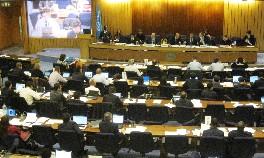 Some progress on reducing greenhouse gas (GHG) emissions from ships was made at the IMO Intersessional Meeting of the GHG Working Group (GHG-WG3). The concept of "no net incidence" through a Rebate Mechanism (RM)
Some progress on reducing greenhouse gas (GHG) emissions from ships was made at the IMO Intersessional Meeting of the GHG Working Group (GHG-WG3). The concept of "no net incidence" through a Rebate Mechanism (RM) ![]() (0.5MB) generated a considerable interest. An optimal rebate key
(0.5MB) generated a considerable interest. An optimal rebate key ![]() (0.2MB) was proposed, with values for all countries. A systematic analysis submitted
(0.2MB) was proposed, with values for all countries. A systematic analysis submitted ![]() , favoured a global application with a RM to ensure no net incidence on developing countries and with revenue used for climate change action.
, favoured a global application with a RM to ensure no net incidence on developing countries and with revenue used for climate change action.
The third Intersessional Meeting of the Working Group on GHG emissions from ships was held in London from 29 March to 1 April 2011. At this meeting the concept of "no net incidence" on developing countries (particularly the most vulnerable) from carbon pricing of international transport generated considerable interest from a number of developed and developing States and observer organizations. Inter alia (for more see the session's report, document MEPC 62/5/1):
[...]
A number of delegations expressed interest in the RM proposal and supported its further development and consideration either as an integral or add-on element to a future MBM for international shipping under IMO
Regarding details, two session documents contained new results contributed on the topic. The document GHG-WG 3/3/11 ![]() (0.5MB), entitled "Towards an optimal rebate key for a global maritime MBM", was submitted by the WWF, based on a study by Dr Andre Stochniol.
(0.5MB), entitled "Towards an optimal rebate key for a global maritime MBM", was submitted by the WWF, based on a study by Dr Andre Stochniol.
- It concluded as follows:
- The annexed Study demonstrates that it is feasible to calculate a suitable proxy for incidence from a global maritime MBM, such as a levy or an emission trading scheme, on different countries. Thus, if so decided, it is feasible to design and implement a global maritime MBM with "no net incidence" on developing countries, by ensuring these countries are compensated for the cost incurred from the global maritime MBM, through a rebate approach.
- It concluded as follows:
- There are various proposals for differentiated application of an MBM for international shipping, but all raise concerns over data, enforcement or competitive distortion. A global mechanism avoids these concerns and could respect the principle of CBDR if it resulted in no net incidence on developing countries. A rebate mechanism could be applied to any revenue-raising MBM, is technically feasible, and if correctly designed, could ensure no net incidence on developing countries.
Key Results from the study on optimal rebate key
Rebate and attribution keys
A country's share of value of imports from non-adjacent countries, adjusted for trade patterns in Europe and in Latin America, is found to be the optimal attribution key to calculate incidence on the country from a global MBM, for all countries irrespective of their trade distances. The key provides the best estimates of the incidence given readily available and reliable data.
According to the calculations presented, in 2007 circa 70% of global trade by value was transported by sea and air. Of this, developed and developing countries accounted for circa 60% and 40% respectively. Thus, the estimate of total incidence on developing countries from a global maritime MBM is circa 40% of its global costs. This is more than the 30% estimate based on value share of imports by all modes of transport (used before in various reports). However, given that some developing countries may pursue the option of foregoing all or part of their rebates, it is still viable to continue to use the 30% as an illustrative integration condition for a global maritime MBM with "no net incidence" on developing countries.
The summary of the proposed rebate keys, based on percentage of global costs of the MBM, is shown below.
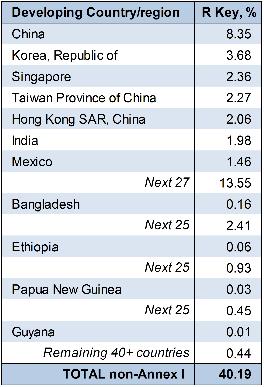
Rebate keys for over 150 developing countries and attribution keys for developed countries are calculated and presented in the annex to the GHG-WG 3/3/11 document (the rebate keys are illustrated below).
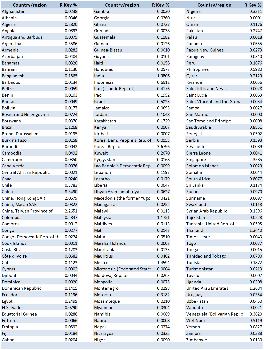
Under the RM proposal, the attribution keys are proposed to calculate and credit the amount of financing
raised through the MBM from each developed country (these are illustrated below)
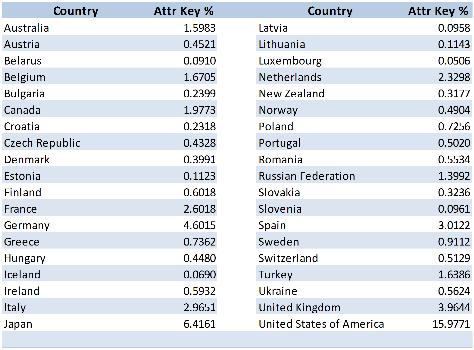
Trade-weighted distances
Comprehensive justification for the calculations are made in the study, including trade-weighted distances for countries, as illustrated below.
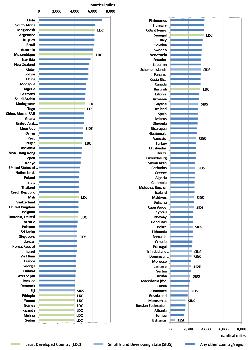
Integration with other Market-Based Measures, or Mechanisms (MBM)
Conditions to integrate the optimal rebate key with the MBM proposals under consideration at the IMO are provided as well. These are summarized on the figure below (updated to reflect submissions to and discussions at the Intersessional Meeting).
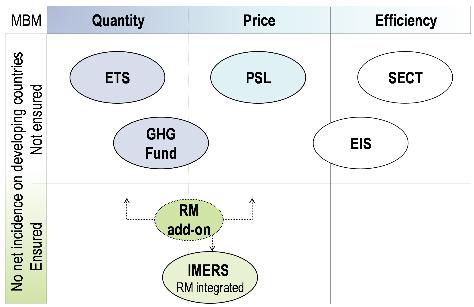
MBM legend:
EIS Efficiency Incentive Scheme
ETS Emission Trading System
GHG Fund International Fund for GHG emissions from ships
PSL Port State Levy
RM Rebate Mechanism; add-on, and integrated (IMERS)
SECT Ship Efficiency Credit Trading
Summary for the session
For a short summary from the session relating to the "no net incidence" see the WWF document MEPC 62/5/14.
Official information on the overall progress achieved during the Intersessional Meeting is available from the IMO.
